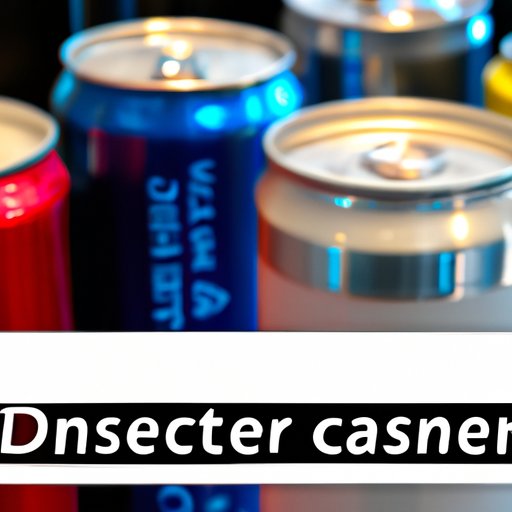Introduction
Diet drinks have been the preferred choice for many people who want to cut calories or manage their weight. But, concerns about the potential link between diet beverages and cancer have grown over the years. Many studies have been done to investigate this possibility, leading to conflicting reports. This article examines the current research to answer the crucial question: Do diet drinks cause cancer?
Exploring the Science Behind the “Diet Drinks Cause Cancer” Debate
The debate on whether or not diet drinks cause cancer remains inconclusive. For instance, a study done by the National Toxicology Program shows that artificial sweeteners such as aspartame and sucralose, used in the production of diet sodas, have led to an increase in cancer rates in rats. However, this research has been criticized for flawed methodology and poor relevance to humans. Additionally, several studies have shown that there is no significant link between the consumption of diet drinks and an increase in cancer risk.
A comprehensive analysis of the available research shows that the findings are inconsistent, and the studies have multiple limitations regarding design and methodology. Therefore, conclusions on the potential link between diet drinks and cancer need to be approached with caution.
The Hidden Dangers of Diet Sodas
Diet drinks have been surrounded by many myths and controversial claims regarding their impact on health. While some of these claims are overstated, the ingredients used in the production of diet drinks have been the center of attention.
Artificial sweeteners like aspartame, saccharin, and sucralose, used to sweeten diet sodas, have been the subject of many health concerns. These sweeteners are calorie-free, and studies have shown that they do not cause an increase in blood sugar levels. However, the long-term effects of consuming artificial sweeteners on the body are inconclusive. Some people may experience adverse side effects such as headaches, dizziness, and digestive issues when they consume too much of these sweeteners.
Is Your Love for Low-Calorie Drinks Putting You at Risk of Cancer?
The potential link between diet drinks and cancer is not entirely understood, but some scientific theories provide insight into how artificial sweeteners could affect the risk of cancer. For example, it has been suggested that artificial sweeteners can cause inflammation and cellular damage, which could result in the development of cancerous cells. Furthermore, artificial sweeteners can alter the gut microbiome, which has implications for gut health and overall wellbeing.
Although more research is needed to determine the effects of artificial sweeteners definitively, it is important to practice moderation and conscious consumption of diet drinks. Limiting consumption of diet drinks can significantly reduce the risk of any potential negative effects they may have on our health.
Raising Awareness About the Risks of Diet Sodas
It is necessary to consider the potential risks of consuming diet drinks and make informed choices about our beverages. Awareness and education on the potential dangers of diet drinks are essential to help people make informed decisions about their health.
To make healthy choices about beverages, it is worth considering drinking water, pure tea, or coffee instead of diet sodas. Additionally, when shopping for drinks, it is critical to read the labels and understand the ingredients. Those with cancer risk factors should consult their doctors regarding the best dietary recommendations for their specific needs.
Society’s Addiction to Sweeteners
Society’s addiction to sweeteners has been blamed for the increased consumption of diet drinks. Artificial sweeteners found in many diet sodas can be alluring due to their no-calorie content and ability to satisfy the craving for sweetness.
It is crucial for society to be aware of the potential health risks surrounding the overconsumption of artificial sweeteners. With the rise of cancer cases today, people need to be more responsible and conscious of their diet choices. A better and more sustainable solution for satiating sweet cravings is by consuming naturally sweet foods such as fruit, vegetables, and whole grains.
Conclusion
The potential link between diet drinks and cancer remains inconclusive, with conflicting reports on the available research. More research is needed to provide a definitive answer on this topic. Despite inconclusive evidence, it is essential to make informed decisions and adopt a moderate approach to the consumption of diet drinks. Drinking water and consuming naturally sweet foods are examples of how people can satisfy sweet cravings while staying healthy. By being aware of the risks and making conscious choices, we can take control of our health.
(Note: Is this article not meeting your expectations? Do you have knowledge or insights to share? Unlock new opportunities and expand your reach by joining our authors team. Click Registration to join us and share your expertise with our readers.)
